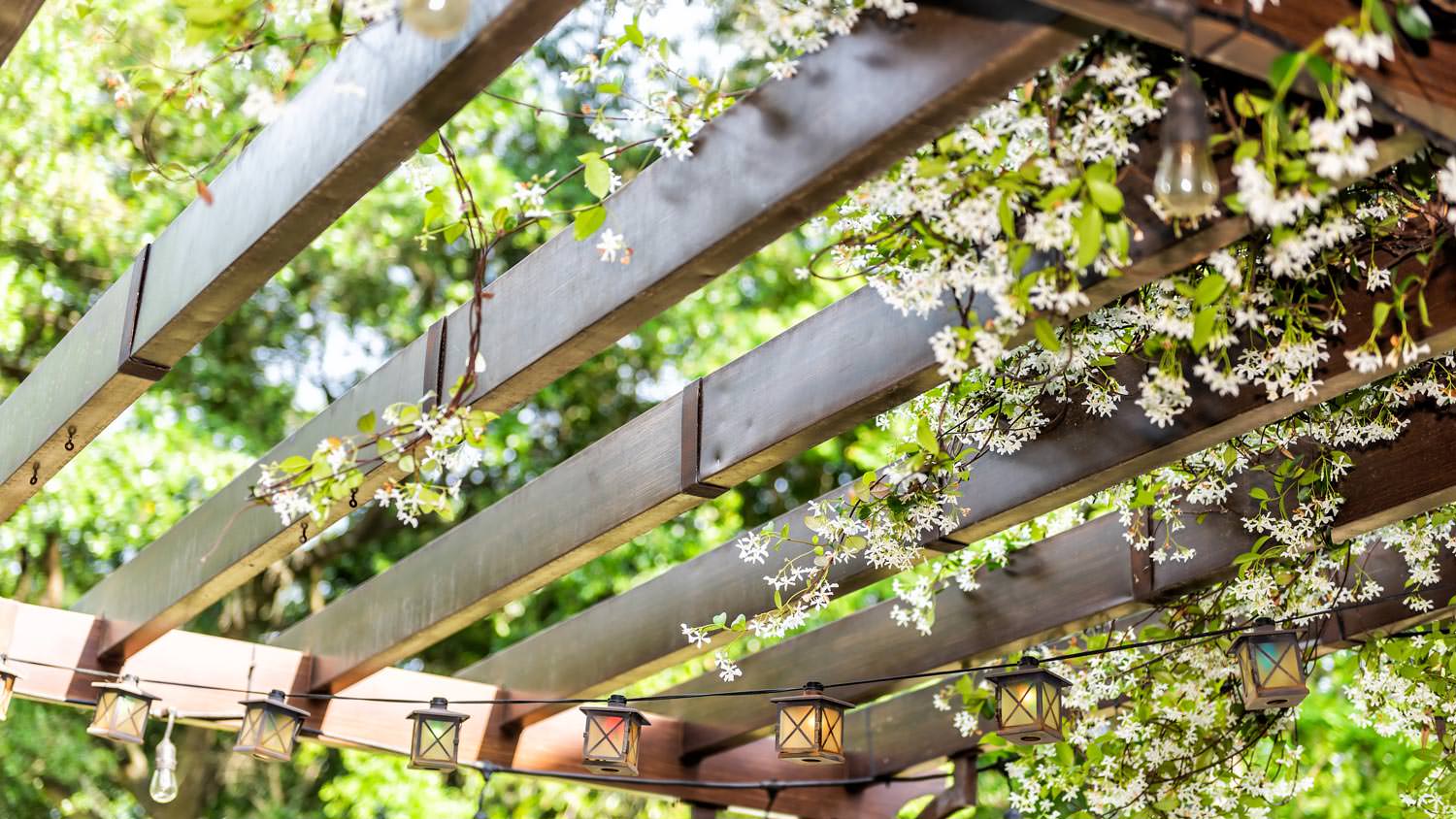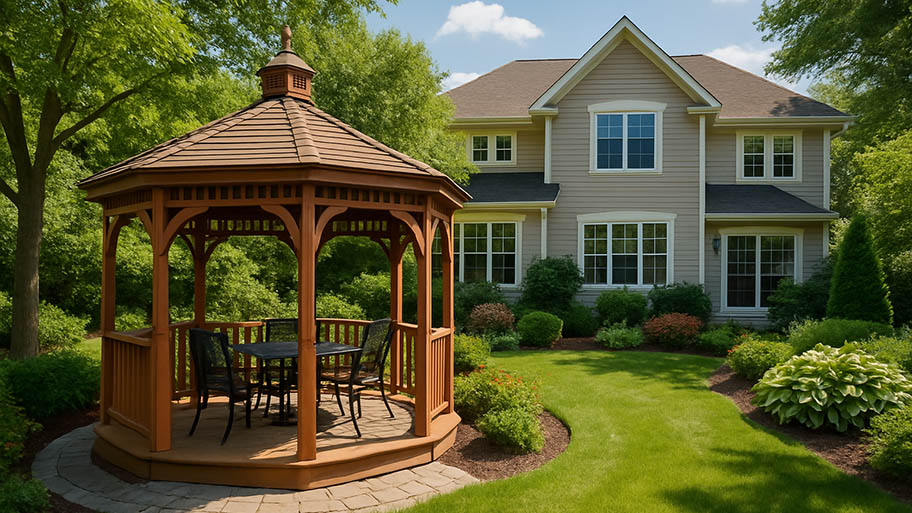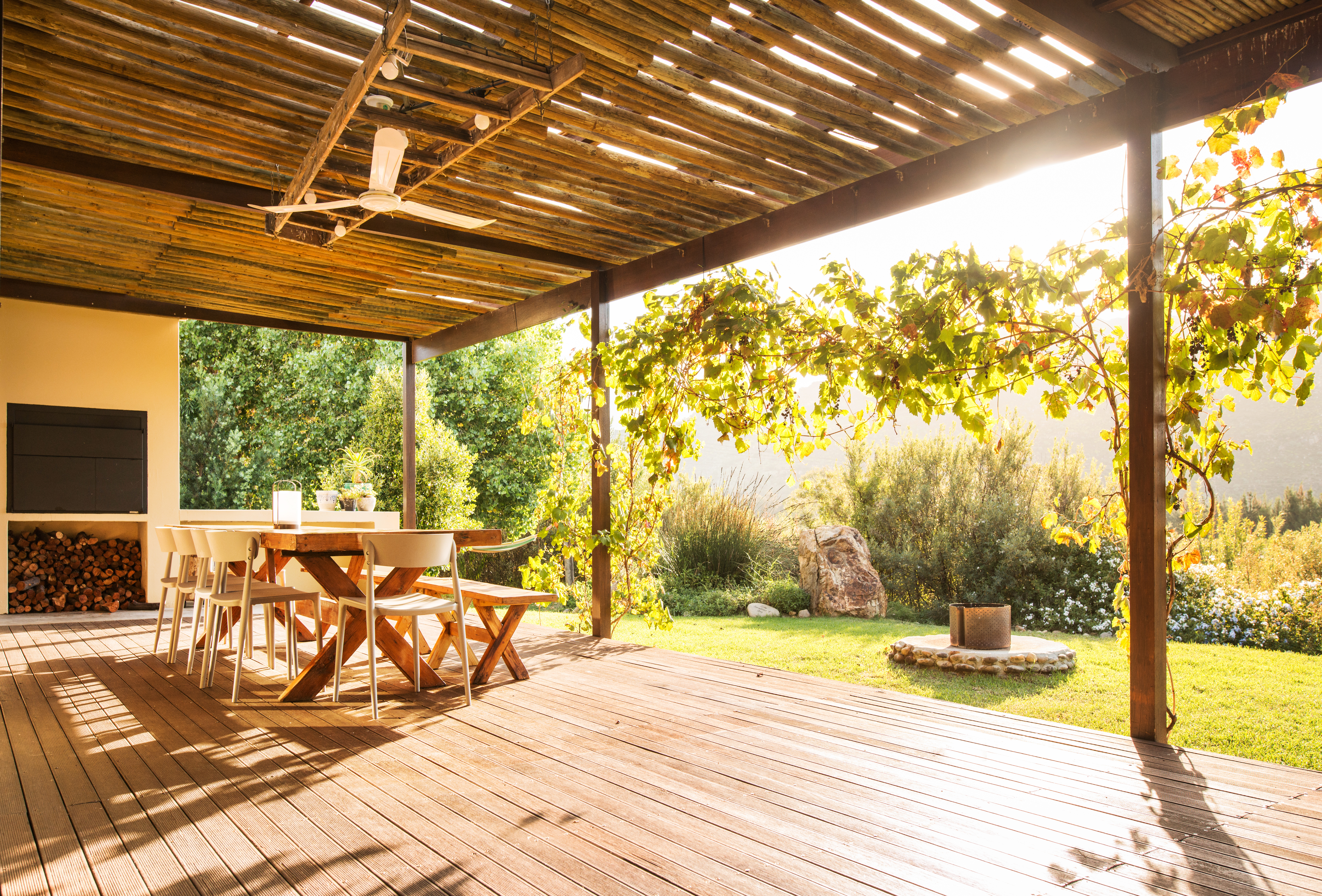
Flagstone gives your outdoor space a gorgeous, rustic feel. Find out the cost of flagstone per square foot or per ton. Our expert cost guide helps you plan your budget for your flagstone project from walkways to patios to walls.
Patio service costs depend on your project and location. Check with a local pro for your specific job.
The size of the pergola and the material you pick will have the biggest impact on your total costs.
Aluminum and vinyl are the most affordable materials, while high-end redwood costs two to four times as much per square foot.
Your pergola will need concrete footings, so budget separately for any patio or deck demolition that you’ll need.
Pergolas are considered permanent structures and will require permits, which can add $50 to $500 to your total, depending on where you live.
The cost to build a pergola ranges from $2,103 to $6,382 on average, with most homeowners spending around $4,240 for a 100-square-foot pergola. How much you'll pay depends on the size of your pergola and the materials.
Having a pergola can transform any backyard from an open space into an intentional landscaping design fit for hosting gatherings and relaxing, so use our expert guide to break down all that goes into the cost of a pergola.
The material you choose affects the cost of your pergola, with aluminum and vinyl coming in at the lower end of the price range and natural wood like redwood coming in at the higher end.
| Material | Average Cost per Square Foot |
|---|---|
| Aluminum | $10–$30 |
| Vinyl | $10–$30 |
| Cedar | $25–$35 |
| Pine | $25–$40 |
| Redwood | $40–$50 |
Aluminum pergolas cost between $10 and $30 per square foot, making them one of the most affordable materials for building a pergola. Aluminum is also weather-resistant and low-maintenance, making it a good long-term investment.
Vinyl costs between $10 and $30 per square foot. Just like aluminum, this material is budget-friendly and fade-resistant. However, vinyl doesn’t last as long as aluminum overall, so you might be better off choosing aluminum if you want to make your dollar go farther.
Cedar costs more than vinyl and aluminum pergolas, with prices ranging from $25 to $35 per square foot. For this higher price tag, your cedar pergola is better equipped to handle extreme weather and is all-natural, insect-resistant, and rot-resistant, making it one of the best wood options for pergolas. Cedar wood is also paint- and stain-friendly for anyone looking to customize the look of their pergola.
Coming in at the top of the price range, redwood costs $40 to $50 per square foot. Like cedar, redwood pergolas are also insect- and rot-resistant and durable in severe weather. Some homeowners may prefer the appearance of redwood, but the material is less sustainable than other readily available wood species and requires more maintenance.
The average cost of a pergola ranges from $30 to $60 per square foot. Since your typical pergola is around 100 square feet, you'll pay between $3,000 to $6,000 to construct a pergola on average. Pergola design styles vary wildly, so here’s a breakdown of different pergola costs by dimension:
| Pergola Dimensions | Average Cost |
|---|---|
| 10x4 | $1,200–$2,400 |
| 10x10 | $3,000–$6,000 |
| 11x11 | $3,600–$7,300 |
| 12x12 | $4,300–$8,600 |
| 12x18 | $6,500–$13,000 |
| 10x14 | $4,200–$8,400 |
| 10x20 | $6,000–$12,000 |
Most pergola contractors charge an additional $500 to $1,000 or $250 to $500 per hour. Most laborers have a team of installers to do the heavy lifting, so you’re paying for several pros to install your pergola. Labor generally accounts for 20% of the cost of the project, while materials make up the remaining 80%. Your pergola pro may also offer additional tasks, such as:
Deck replacements or repairs: $2,100
Motorized pergola: $13,700
Screening: $2,800
On top of your typical cost to build a pergola, you may also need to invest in prep work and permits.
Depending on the type of deck, you could use one as the foundation for your pergola. Deck refinishing costs range from $900 to $2,700. If you don't already have a foundation for your pergola, then you'll need to invest in building a base. A new concrete slab costs around $600 for a 100-square-foot slab.
You may also need to level your yard before pouring the concrete. Leveling a yard costs another $1 to $2 per square foot or $100 to $200. Lastly, any obstacles like trees and boulders need removing. Boulder removal costs range from $650 to $1,200, while tree removal costs fall between $200 and $2,000 per tree.
While most people don't need to acquire a permit to build a pergola, some municipalities require it. You could spend anywhere from $50 to $500 depending on the scope of the project.
While you could save between $500 and $1,000 in labor by building your own pergola, the project’s complexity makes professional installation a better choice for most homeowners. A local pergola contractor will ensure that your structure has an adequate foundation, is level, and complies with local building code requirements.
Building a pergola is a complex project with many variables, and hiring a pro is the best option for these reasons:
Professionals handle the necessary permits and inspections, ensuring the structure meets local building codes.
They possess the tools, equipment, and expertise to excavate and lift heavy materials safely.
Installers ensure each post is level and properly anchored to prevent collapse or shifting.
Pros can recommend the best location based on sun patterns, usability, privacy, and drainage.
Contractors select materials that are suited to your climate and offer long-term durability.
Licensed pros provide warranties, handle cleanup, and give long-term maintenance advice.
Professional installation maximizes curb appeal and home value.
If you’d like to get involved with the project, there are several smaller tasks you can accomplish, such as the following:
Consider types and styles of pergolas to discuss with your contractor
Remove trees and shrubs around the construction site
Clear debris, old landscaping, or smaller structures before work begins
Measure and stake out a rough footprint for discussion
Paint or stain your new pergola after construction
Install furniture, accessories, and other finishing touches

Repairing a pergola costs between $30 and $60 per square foot for materials plus labor rates ranging from $50 to $100 per hour. For example, if your pergola repair is simple and only requires five square feet of replacement materials and an hour of work, then you could spend anywhere from $200 to $400 in total.
If your pergola is in poor condition and needs more than 50% of the cost of a new one, you’re better off replacing it with a new, sound structure to avoid future expenses.
Saving on the cost of your pergola can go a long way given the cost of the structure. Here are tips for lowering the cost of building a pergola:
Use an existing foundation if you already have one. A deck or patio can help save on additional foundation expenses. Hiring a local concrete company to pour concrete can add up.
Choose a level building site free of trees or other obstructions to avoid leveling and obstacle removal costs.
Avoid large pergola structures or custom builds.
Choose aluminum or vinyl building materials instead of hardwood.
Be prepared to discuss material options, style considerations, and your project’s budget with the contractor.
Determine whether a prefabricated or custom-built pergola is the best choice for you.
Request an itemized quote that includes labor, materials, permits, site cleanup, and other expenses.
Review warranty details and terms, as well as any maintenance needs.
Discuss how long the build will take and what access the crew will need.
Pergolas can increase your home’s value—but not necessarily. If done right, a pergola adds style and beauty to your landscape, making potential buyers more likely to invest in your home. At the same time, a poorly built pergola that isn't up to code can be a safety hazard and structural burden to potential buyers, making your home less valuable. That's why it's crucial to plan your pergola design well and work with a pro to get the most out of your investment.
Home is the most important place on earth, which is why Angi has helped more than 150 million homeowners transform their houses into homes they adore. To help homeowners with their next project, Angi provides readers with the most accurate cost data and upholds strict editorial standards. We survey real Angi customers about their project costs to develop the pricing data you see, so you can make the best decisions for you and your home. We pair this data with research from reputable sources, including the U.S. Bureau of Labor Statistics, academic journals, market studies, and interviews with industry experts—all to ensure our prices reflect real-world projects.
Want to help us improve our cost data? Send us a recent project quote to [email protected]. Quotes and personal information will not be shared publicly.
From average costs to expert advice, get all the answers you need to get your job done.

Flagstone gives your outdoor space a gorgeous, rustic feel. Find out the cost of flagstone per square foot or per ton. Our expert cost guide helps you plan your budget for your flagstone project from walkways to patios to walls.

The average gazebo installation cost depends on the size and material. Keep reading to discover how much your gazebo may cost.

Learn the cost of a metal awning for your home. Discover the essentials of installation, materials, and labor, and explore ways to save on your project.

Poor fitting, age, and damage can make your deck lopsided. Learn what causes unwanted unevenness and how to level a deck with these steps.

Looking to take your outdoor kitchen to the next level? Here are the best flooring options for exterior cooking spaces, based on climate, functionality, and aesthetics.

Many common patio problems can be addressed early. Here are ways to repair different types of patio damage and how to know your problem needs a pro.